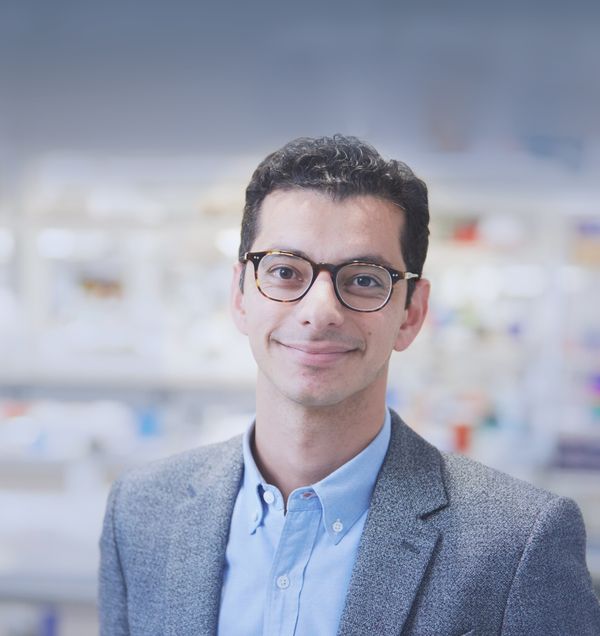Schmidt Award Will Empower Khalil to Pursue Cross-Disciplinary Research

Associate Professor Ahmad “Mo” Khalil (BME) has earned the Schmidt Science Polymaths Award, recognizing him as a bold researcher and fueling the possibility of advances toward the engineering of new multicellular systems, including plants, that can help humanity address devastating diseases and grapple with climate change.
Granting Khalil and his lab $500,000 a year for five years, the award was conferred on him by Schmidt Futures, a philanthropic initiative of former Google CEO Eric Schmidt and his wife, Wendy Schmidt.
“Mechanisms that provide unrestricted funding to pursue entirely new research directions, especially in spaces that fall across disciplines, are rare,” says Khalil. “The idea behind this award is to encourage newly tenured professors to work in those areas and empower them to make shifts in their research and take on new and interesting problems. I am absolutely thrilled for our lab to join this amazing program, and equally excited to see what discoveries our brilliant researchers will make with this funding.”
One possible direction for Khalil, he says, is developing efficient and effective methods for engineering plants, which could accelerate the sustainable production of crops with qualities such as increased yields, pathogen resistance, and drought tolerance.
“For sustainability, to feed a growing population amid climate change,” says Khalil, “accelerating the engineering of plants is a very important frontier, and we’re excited to use the Schmidt award to work with our fantastic collaborators in contributing to this critical effort. Beyond applications in sustainability, the ability to reliably and precisely manipulate the genomes of plants, as we now readily do with other cell types, could open up new avenues for basic science involving these multicellular organisms.”
Plants, Khalil explains, have historically been central to our understanding of how organisms regulate genes and “encode” experiential memories of environmental changes. That process is called epigenetic memory.
The Schmidt award is not binding—while pursuing this research, Khalil and his team might well hit upon an unexpected finding that would take them in a new direction. Essentially, the foundation is making a bet on Khalil, signaling that they trust him to come up with something novel that will make a big impact on the scientific community and the world at large.
That confidence in Khalil is based on a solid track record of fostering cross-disciplinary collaborations, a history of pursuing research in a diverse set of fields, and a capacity to develop and share promising technologies with the scientific community. After all, Khalil began his academic career as a mechanical engineer, but today he is better known as a pioneer of synthetic biology.
In particular, Khalil’s team builds molecular “circuits” that control how genes are expressed and regulated in eukaryotic cells, and they’ve used this bottom-up approach to make fundamental discoveries about gene regulation and epigenetic memory. More recently, they have translated these insights into gene circuit engineering platforms that enable the programming of human cells, such as immune cells, for a new generation of cellular therapies that might one day be used to combat diseases such as cancer.
Khalil and his team are also inventors of technologies, such as eVOLVER, a continuous culture system that can be programmed to enable the automated evolution of molecules and cells in the laboratory with unprecedented flexibility and scale. Now in use in more than 50 universities and companies internationally, this DIY open-source system is infinitely adaptable, allowing researchers to create custom automation tools for their own microbial experiments.
The support from the Schmidt award will enable Khalil’s laboratory to develop other new and potentially transformative platform technologies that, like eVOLVER, not only expand his lab’s science into new territories but also empower scientists around the world to undertake new and creative experiments.
“We like to ask the simple yet bold questions, ‘What if we built it?’ and ‘What can we learn from this process?’” says Khalil. “That inverse approach to the study of biology forces one to question prevailing assumptions, and it can lead to surprising results.”
Just ten researchers were named Schmidt Science Polymaths this year, representing a range of expertise across STEM fields.
“Single-minded specialization coupled with rigid research and funding structures often hinder the ambition to unleash fresh perspectives in scientific inquiry,” says Stuart Feldman, chief scientist of Schmidt Futures. “From climate change to public health, the Schmidt Science Polymaths utilize the depth of their knowledge across a breadth of fields to find new ways to solve some of our hardest problems for public benefit.”